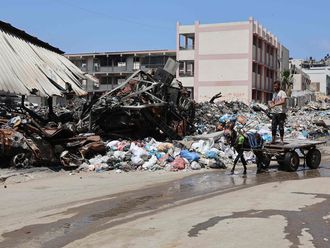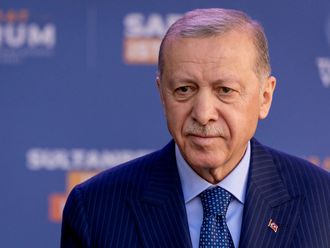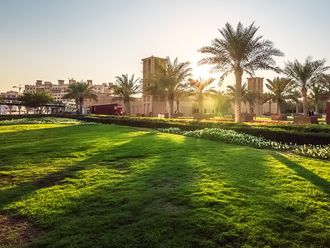Doha: Syria’s main opposition bloc, under US pressure to reshape into a widely representative government-in-exile, agreed on Monday to broaden its structure to accommodate 13 other groups, a spokesman said.
The decision by the Syrian National Council (SNC) came on the second day of a four-day meeting of opposition groups in the Qatari capital Doha aimed at forging a more united front against Syrian President Bashar Al Assad’s regime.
Participants “have agreed a restructuring plan and to reduce the number of [current] members of the general secretariat to accommodate 200 new members representing 13 political groups and independents,” said SNC spokesman Ahmad Kamel.
Kamel said the existing membership would be reduced from 313 to 220 to pave the way for the additional 200 members. The general secretariat will convene in its revamped form on Tuesday, he added.
The meeting is also expected to discuss an initiative by leading dissident Riad Saif, which seems to enjoy US support but has encountered reservations from some SNC members, to unite all Syrian groups opposed to Al Assad.
The initiative will top the agenda of a broader meeting on Thursday called by host Qatar and the Arab League.
“We will form a political leadership that will in turn form a government of technocrats,” Saif said on Sunday, insisting his proposal was “not to replace the SNC which should be an important component.”
Qatari Prime Minister Shaikh Hamad Bin Jassem Al Thani said his government will back any agreement reached by the Syrian opposition factions but insisted they must now unite.
“We will support what the Syrian people agree on. I think the meeting in Doha is very important. I think everybody is waiting to see an agreement between all the Syrian opposition,” he told reporters in Addis Ababa.
“Part of the problem now is that we have many oppositions ... The time now is to be united... and we need one address for the opposition,” he said.
Saif and some two dozen Syrian opposition figures who gathered in Amman on Thursday came up with proposals for a new body to represent the disparate groups opposing Al Assad.
Among those in attendance were some SNC members, former premier Riad Hijab who defected in August, Ali Sadreddin Bayanuni of the Muslim Brotherhood and Kurdish and tribal representatives.
State Department spokeswoman Victoria Nuland said: “We’ve said from the beginning... that we expect that the SNC itself will be part of the opposition structure that emerges from the Doha process... but that other groups in addition to the SNC will also be represented.”
But she added it was not yet clear which other groups would be invited to join.
“Just broadening the numbers doesn’t necessarily broaden the representation, so we think we have to see who they actually bring into the group,” Nuland told journalists.
US Secretary of State Hillary Clinton last week called the SNC unrepresentative of opposition forces on the ground and said it “can no longer be viewed as the visible leader of the opposition.”
But the SNC hit back at the US criticism on Friday, accusing Washington of undermining the revolt and “sowing the seeds of division.”
The SNC has sought to be the interlocutor between the international community and forces opposed to the Al Assad regime since its formation six months after the start of the uprising in March last year.
But divisions have dogged opposition ranks. Some groups strongly oppose the armed struggle being waged by the rebel Free Syrian Army against government troops with the backing of the SNC.
Russian Foreign Minister Sergei Lavrov criticised western and Gulf Arab countries for failing to use their influence with the rebels encourage them to “sit at the negotiating table”.
Some foreign governments preferred to “unify the rebels not on the basis of negotiations but on the basis of continuing the fighting”, he told a Cairo news conference.
Al Assad’s government accuses Qatar and Saudi Arabia of channelling weapons to the rebels through Turkey with western blessing.
Russia and China have repeatedly blocked western- and Arab-backed efforts for tougher action against Al Assad’s regime at the UN Security Council.












